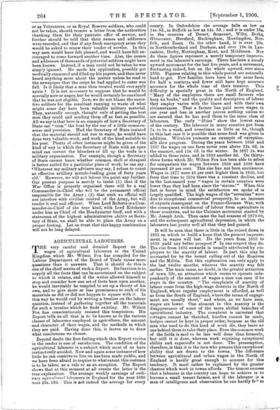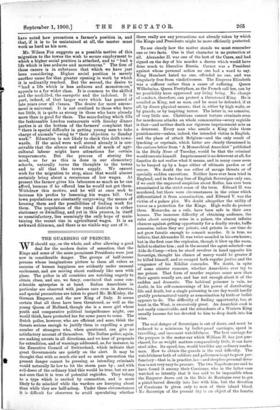AGRICULTURAL LABOURERS. T HE very careful and detailed Report on the
wages of agricultural labourers in the United Kingdom which Mr. Wilson Fox has compiled for the Labour Department of the Board of Trade raises more questions than it answers. That it should do this is one of the chief merits of such a Report. Its function is to supply all the facts that can be ascertained on the subject to which it relates, and if the writer allowed himself to stop and consider how one set of facts bore upon another, he would inevitably be tempted to set up a theory of his own, and to give more or less prominence to such of his materials as did or did not happen to square with it. In this way he would end by writing a treatise on the labour question, instead of gathering together all the materials for such a treatise which he finds existing. Mr. Wilson Fox has conscientiously resisted this temptation. His Report tells us all that is to be known as to the various classes of labourers employed in agriculture, the amount and character of their wages, and the methods in which they are paid. Having done this, it leaves us to draw what conclusions we choose.
Beyond doubt the first feeling which this Report excites in the reader is one of satisfaction. The condition of the agricultural labourer is a subject which most of us have instinctively avoided. Now and again some instance of how little he can contrive to live on has been made public, and we have been afraid to inquire to what extent this instance is to be taken as a rule or as an exception. The Report shows that at this moment at all events the latter is the true explanation. The average weekly earnings of ordi- nary agriculture' labourers in England for the year 1898 were 16s. 10d. This is not indeed the average for every county. In Oxfordshire the average falls as low as 14s. 8d., in Suffolk as low as 14s. 5d. ; and it is under 168. in the counties of Dorset, Somerset, Wilts, Berke, Gloucester, Hereford, Buckingham, Huntingdon, Nor- folk. and Essex. On the other hand, it is over 20s. in Northumberland and Durham, and over 19s. in Lan- cashire, Derby, Nottingham, Kent, and Middlesex. Nor do these figures represent a merely temporary improve- ment in the labourer's earnings. There has been a steady upward movement for the last five years, and a movement, fluctuating indeed, but on the whole upward, ever since 1850. Figures relating to this whole period are naturally hard to get. Few families have been in the same farm for half a century, and fewer still have kept accurate accounts for the whole time of their tenancy. This difficulty is specially great in the North of England. "Many of the employers there are small farmers who keep no books," and the quality and description of labour they employ varies with the times and with their own circumstances. That a farmer has paid more wages in one year and less in another proves nothing unless we are assured that he has paid them to the same class of labourers. The early "fifties" show the lowest rates of the century. The labourer in many counties got from 7s. to 9s. a week, and sometimes as little as 6s., though in this last case it is possible that some food was given in addition. Wiltshire presents an example of exception- ally slow progress. Dining the years between 1850 and 1897 the wages on one farm never rose above 12s. 6d. in the summer, and us. a in the winter. In 1897 is. was added to these rates, and in 1899 another 6d. On thirty.. three farms which Mr. Wilson Fox has been able to select for comparison the wages between 1850 and 1899 have increased 48 per cent. This rise has not been continuous. Wages in 1877 were 46 per cent, higher than in 1850, but from that time to 1894 there was a constant decline, and in the last-named year "wages in certain counties were lower than they bad been since the 'sixties." When this fact is borne in mind the satisfaction we spoke of is largely qualified. The high wages of the "seventies" were due to exceptional commercial prosperity, to an increase of exports consequent on the Franco-German War, with the consequent withdrawal of labour from agriculture in those countries, and to the Unionist movement started by Mr. Joseph Arch. Then came the bad seasons of 1879-80, and the subsequent agricultural depression, in which the labourers lost pretty well all that they had gained.
It will be seen.that there is little in the record down to 1895 on which to build a hope that the present improve- ment in wages will last. Do the years from 1895 to 1899 yield any better prospect In one respect they do. The rise from 1895 onwards is usually attributed by em- ployers to the scarcity of labour. In part this may be accounted for by the recent calling out of the Reeerves and the Militia. But this explanation can only apply to the last twelve months, whereas the scarcity was felt earlier. The main cause, no doubt, is the greater attraction of town life, an attraction which seems to operate inde- pendently of the amount of wages a man can earn if he stays in the country. " The complaints of scarcity of labour come from the high-wage districts in the North of England, where regular employment is afforded, as well as from the South of England, where the terms of engage- ment are usually short," and where, as we have seen, wages are lower. One element in this scarcity is the disappearance of some of the more skilled branches of agricultural industry. The complaint is universal that cottages cannot be thatched, hurdles cannot be made, hedges cannot be kept in proper order, because as the old men who used to do this kind of work die, they leave no one behind them to take their place. Even the common work of the fields is said to be less well done than formerly, but still it is done, whereas work requiring exceptional ability and experiente is not done. The presumption, therefore, is that it is the men who possess this exceptional ability that are drawn to the towns. The difference between agricultural and urban wages in the North of England is hardly great enough to account for this tendency. It must rather be explained by the greater chances which work in towns affords. The utmost success that a labourer in the country can hope to achieve is to become a small tenant farmer, and if the labourer is a man of intelligence and observation he can hardly fa" to
have noted bow precarious a farmer's position is, and that, if it is to be maintained at all, the master must work as hard as his men.
Mr. Wilson Fox suggests as a possible motive of this migration to the towns the wish to secure employment to which a higher social position is attached, and to "lead a life which is less arduous and monotonous." The first of these causes is in substance that which we have just been considering. Higher social position is merely another name for that greater opening in work by which it is ordinarily reached. But the second, the desire to "lead a life which is less arduous and monotonous," appeals to a far wider class. It is common to the skilled and the unskilled, the energetic and the indolent. It is part, indeed, of that larger wave which has passed of late years over all classes. The desire for more amuse- ment is universal. It is not confined to those who have too little, it is quite as strong in those who have already more than is good for them. The same feeling which fills the fashionable London restaurants with Sunday dinner parties is at the bottom of the farmers' complaint that "there is special difficulty in getting young men to take charge of animals " owing to "their objection to Sunday work." Education is not likely to check this drift town. wards. If the mind were well stored already it is con- ceivable that the silence and solitude of much of agri- cultural labour might have attractions for certain temperaments. But the process of storing the mind, so far as this is done in our elementary schools, naturally turns the thoughts to the towns and to all that the towns supply. We cannot wish for the migration to stop, since that would almost certainly bring about a recurrence of low wages. At present the farmer gives his labourers as much as he can afford, because if he offered less he would not get them. Withdraw this motive, and he will at once seek to increase his profits by lessening his wages bill. Our town populations are constantly outgrowing the means of housing them and the possibilities of finding work for them. The population of the rural districts is either stationary or dwindling, and yet in this process, in itself so unsatisfactory, lies seemingly the only hope of main- taining the recent rise in agricultural wages. It is an awkward dilemma, and there is no visible way out of it.



































 Previous page
Previous page